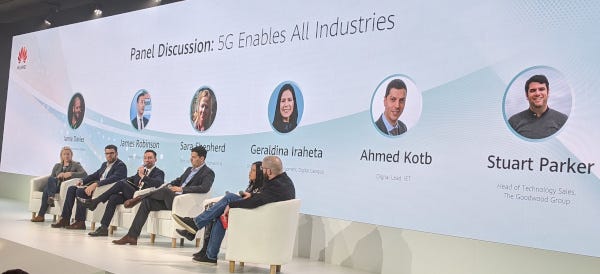Huawei is still the leader on 5G commercial contracts
Chinese vendor Huawei went ahead with its big pre-MWC event in spite of everything and the standard levels of self-promotion took place.
February 20, 2020

Chinese vendor Huawei went ahead with its big pre-MWC event in spite of everything and the standard levels of self-promotion took place.
Just as with last week’s Ericsson event, the cancellation of MWC due to the threat posed by coronavirus cast a pall over Huawei’s pre-show extravaganza. In fact Huawei had taken the trouble to reassure attendees yesterday that all precautions had been taken to protect them from any viral nastiness, including the self-quarantine of any Huawei employees travelling from China. We’re pleased to report an almost total absence of sneezing at the event.
The first keynote was delivered by the President of Huawei’s Carrier Business Group, Ryan Ding. He started by announcing, in an admirably steady voice, that while 4G delivers information, 5G delivers emotion. Ding served up the expected slide featuring photos of white boxes Huawei had intended to fondle at MWC, which included the claimed lightest ever 5G base station, weighing in at a mere 25 kilos.
The most interesting slide to us, however, contained an update on the number of 5G commercial contracts Huawei has won, which now total 91. This puts them ahead of the 81 announced by Ericsson last week and well ahead of the 63 most recently announced by Nokia. Appropriately enough, Huawei’s event was many times larger than Ericsson’s, while Nokia has held no pre-MWC event that we’re aware of.
Within that 91, more than half (47) are in Europe, which is likely to trigger US President Trump more than ever, 27 are in Asia and 17 are elsewhere in the world. There were some further boasts and an attempted demo of a live 5G broadcast from the BBC, which sadly lacked audio. Ding concluded with the announcement of a $20 million investment in its UK partner innovation programme.
The undoubted highlight of the morning, however, was a panel discussion on how 5G can enable a bunch of different industries. The reason it was so great was that it was moderated by none other than Telecoms.com Deputy Editor Jamie Davies, who shrugged off a rugby injury to bring his characteristic wit and insight to the chat.

The general tone of the panel, which featured five spokespeople from UK industry, was cautious optimism about what 5G brings to the table. It was note that in its current form it offers little more than a speed boost, but things should get interesting when low-latency kicks in with standalone 5G. There was lots of speculation about what can be done to drive consumer engagement in 5G, but few concrete answers.
These sorts of big corporate chest-beating events aren’t really designed for journalists as everything (bar the panel discussion) is very scripted and rehearsed. Having said that, apart from the deal wins, Huawei didn’t overdo the self-aggrandizing. It remains in a precarious geopolitical position and claiming leadership of everything, whether true or not, is probably not a great look for Huawei right now.
UPDATE, 13:00 20/2/20: In a subsequent media round table Huawei clarified that the deal wins are all unique 5G RAN operator customers. We were told that there was very little disruption to their own manufacturing from coronavirus apart from some people having a hard time getting back from their holiday. They don’t expect the devices supply chain to be affected at all. We asked which specific area Huawei considers it has a strong advantage over its competitors and they simply said “technology”. They said they spent $18 billion on R&D last year, which they reckon is loads more than any of their competitors, but that presumably includes devices and other stuff their competitors don’t do.
About the Author(s)
You May Also Like











_1.jpg?width=700&auto=webp&quality=80&disable=upscale)


.png?width=800&auto=webp&quality=80&disable=upscale)